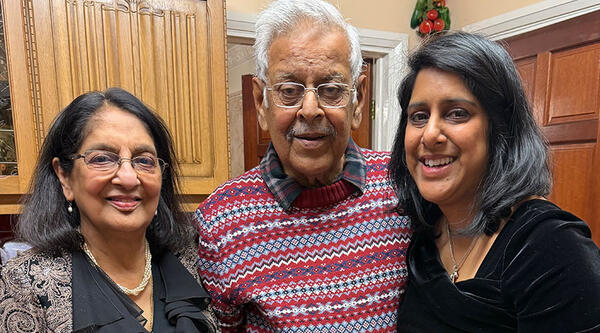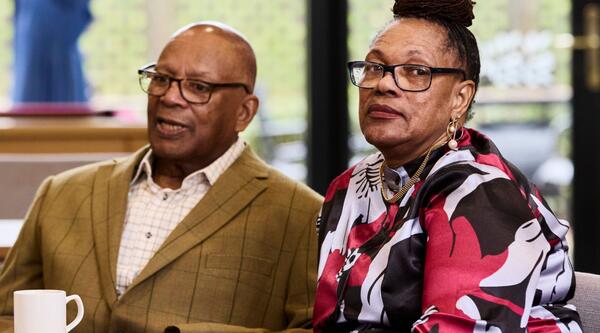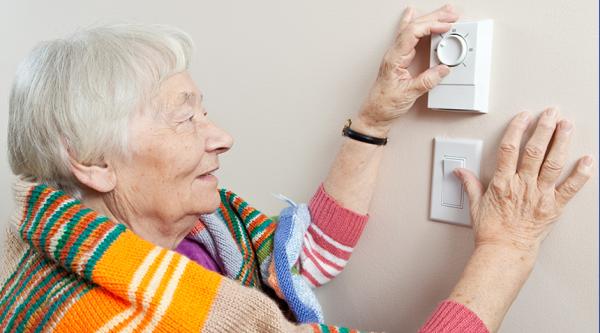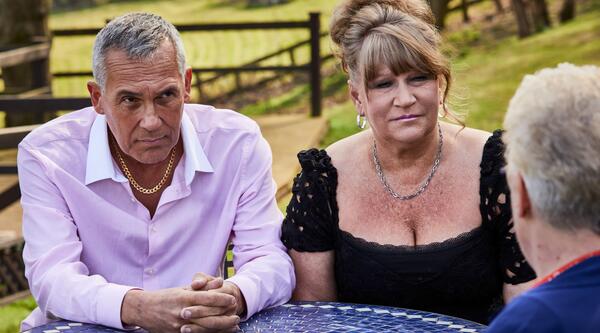Emergency admissions from dementia care failures soaring, and worse to come warns charity
Join Alzheimer's Society's #CureTheCareSystem campaign, urging Governments to reform the social care system
- 27% increase over four-year period, as spending cuts bite
- Nearly two thirds of these dementia emergency admissions could have been avoided
- Nearly three quarters of family carers said their loved one with dementia had experienced medical issues because of a lack of support, and one in nine had been rushed to hospital
An Alzheimer’s Society investigation, launched to mark Dementia Action Week, has revealed, even before the pandemic, tens of thousands of people with dementia were being rushed to hospital each year, up 27%, because inadequate social care left them unprotected from infections, falls and dehydration.
This news comes just under a week after the Queen’s Speech frustratingly made only a brief mention of the Prime Minister’s promise nearly two years ago to deliver a clear plan for social care reform, a devastating blow for the 850,000 people living with dementia, worst hit by coronavirus.
The investigation, involving FOIs to NHS Trusts, found a 27% rise between 2015 – 2019 of people with dementia sped to hospitals with avoidable emergencies. And in 2019, nearly two thirds (65%) of all emergency admissions of people with dementia were for avoidable illnesses and injuries caused by failures in care.
During Dementia Action Week, Alzheimer’s Society is releasing a hard-hitting TV ad which is calling on the government to ‘cure the care system’. Supported by billboard advertising, the heart-wrenching advert exposes the stark reality of being a dementia carer without adequate support.
In a supporting survey of unpaid dementia carers, almost half (48%) reported that they had performed tasks they felt unqualified to carry out because of a lack of support, and as a result, they reported three-quarters (72%) of people with dementia having medical issues at home.
Three in ten had experienced avoidable falls (29%), one in six missed medication (16%), one in five hurt themselves in the house (22%) and one in nine (11%) reported their loved one being rushed to hospital in an avoidable emergency.
And, as recently reported, this devastating lack of support means many family carers are at breaking point, with 95% admitting it impacts their physical or mental health, 69% reporting feeling constantly exhausted, 64% feeling anxious and 49% feeling depressed.
While an increase in the number of people with dementia has contributed in part to the rise in avoidable admissions, much of the increase is thought to be due to cuts in spending on adult social care piling pressure on A&E and ambulance services.
With interruptions to routine health and care services, and isolation enforced by lockdown, people with dementia have seen massive health deterioration over the pandemic, and with spending cuts biting, the charity warns it expects hospital admissions to increase sharply, costing the NHS millions, unless drastic action is taken to improve dementia care.
In the last month alone, Alzheimer’s Society has heard shocking reports of people with dementia losing the ability to walk, getting pneumonia, and being rushed to hospital with kidney damage from dehydration. All avoidable with quality dementia care.
During Dementia Action Week, 17 – 23 May, Alzheimer’s Society is urging Governments to honour their promise to rebuild the broken social care system, so that people with dementia get high quality, accessible social care, free at the point of use, like the NHS - because dementia isn’t curable yet, but the care system is: visit alzheimers.org.uk/DAW to join our #CureTheCareSystem campaign.
Kate Lee, Chief Executive Officer at Alzheimer’s Society, said:
'Lockdown has left people with dementia cut off from vital support and care. Interrupted routines, loneliness and isolation have contributed to rapid symptom progression, meaning there’s now more people than ever fighting for scarce dementia care. Without urgent action, avoidable hospital admissions will skyrocket, costing the NHS millions.'
With no drugs to cure or slow down the condition, it’s social care that people with dementia rely on every day. But lack of time and dementia-specific training among the overworked and underpaid care workforce means people with dementia aren’t getting the support they need, either in their homes or in residential care, leading to emergency admissions and more pressure on the NHS.
Angela’s mum Maureen, 83 from London, has vascular dementia and has been rushed to hospital twice because she hasn’t been given the care she needs. When Maureen moved into a care home, her mobility began to decline because staff didn’t have the time or training to encourage her to keep moving and drink enough. And once lockdown began, Angela wasn’t allowed to see her mum or take her out for walks.
Angela said: 'Because of my mum’s dementia, I know she won’t drink and will sit in the same position for hours on end unless she’s encouraged to move. But if she doesn’t, she’ll end up very ill and in a lot of pain.
'The first time mum was rushed to hospital she had gotten arthritis in her spine, and the second time she had Deep Vein Thrombosis in her leg. Both times the doctor said it was from sitting still too long. She was badly dehydrated too the second time she went in.
'My mum means the world to me, and it’s heart-breaking to see her lose her mobility and be in pain for something as simple as being encouraged to drink and move around a few times a day.'
Kate Lee continued: 'Decades of chronic underfunding and neglect have led to a care system that’s inadequate and deeply unfair – the pandemic has exposed these failings like never before. People with dementia have been worst hit, accounting for over a quarter of all deaths and many more rapidly deteriorating from lockdown’s knock-on effects; family carers are exhausted.
'This cannot be the kind of society that we expect today and that we want to grow old in - never again must people affected by dementia face such devastation.
'The legacy of this terrible year must be a reformed social care system, which is free at the point of use and put on an equal footing with the NHS. We need a system that gives every person with dementia the support they deserve and so desperately need.'
To support Dementia Action Week (17-23 May 2021) visit alzheimers.org.uk/DAW and join our #CureTheCareSystem campaign. And for information, advice and support call Alzheimer’s Society Dementia Connect support line (0333 150 3456) or visit our website.








